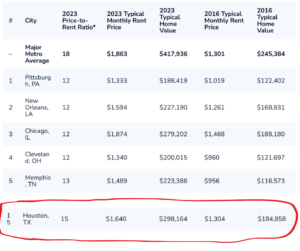According to a recent analysis, Houston is included in a group of 18 out of the 50 largest cities in the United States where buying a home is more favorable than renting. The study, conducted by real estate data firm Clever, ranks Houston at the 15th position among the 50 most populous cities based on its price-to-rent ratio. This ratio compares the cost of purchasing a home to the cost of renting one. A ratio of 15 or lower indicates that buying is a better option, while a ratio of 21 or higher suggests that renting is more advantageous. Ratios between 15 and 21 imply that the decision to buy or rent may depend on individual circumstances, as stated by Clever. Houston shares a ratio of 15 with Cincinnati, Birmingham (Alabama), Philadelphia, Indianapolis, Atlanta, New York, and Louisville, Kentucky.

In Houston, the average monthly rent payment stands at $1,640, whereas the average monthly mortgage payment, based on a 6.8% mortgage rate, amounts to $1,952. The average home value in Houston is $298,164, in comparison to the national average of $417,936. Looking back at historical data, the typical price of homes in Houston has significantly increased since 2016. In that year, the average monthly rent was $1,304, while the average home value was $184,858.
According to the study, the average across the 50 most populous metropolitan areas in the United States shows that it takes approximately 214.7 months of rent to accumulate the equivalent amount required to purchase a home. In Houston, the average number of months of rent required to purchase a home is 181.8. While still a significant period of time, it is relatively lower compared to the national average. This indicates that in Houston, on average, renters have the potential to accumulate the equivalent amount needed to buy a home in a shorter timeframe compared to the overall average across the country. However, it is important to note that this figure can vary depending on individual circumstances and the specific housing market conditions in Houston.
To tackle the issue of affordable housing, policymakers have several potential strategies at their disposal. These include:
- Increasing the supply of affordable housing: Policymakers can incentivize the construction and development of affordable housing units through subsidies, tax credits, and streamlined regulations. This can help address the shortage of affordable homes and provide more options for low-income individuals and families.
- Implementing rent control measures: Rent control policies can help protect tenants from steep rent increases and provide stability in rental costs. However, it’s important to strike a balance that ensures landlords can maintain and invest in their properties while also preventing excessive rent burdens on tenants.
- Providing financial assistance: Governments can offer financial assistance programs, such as rental subsidies or housing vouchers, to low-income families. These initiatives can help bridge the affordability gap and enable individuals and families to secure suitable housing options.
- Promoting mixed-income communities: Encouraging the development of mixed-income neighborhoods can foster socio-economic diversity and provide more affordable housing options within desirable areas. This approach aims to avoid concentrating poverty in specific regions and promotes inclusive communities.In the meantime, individuals considering the rent-or-buy decision should carefully evaluate their financial circumstances and weigh the pros and cons of each option. Factors such as stability, long-term financial goals, housing market conditions, and personal preferences should be taken into account. Seeking guidance from financial advisors or housing counselors can provide valuable insights and help make informed decisions regarding housing choices.Houston presents a favorable scenario for buying a home rather than renting, based on the analysis. With a price-to-rent ratio of 15, Houston is among the 18 out of the 50 largest cities in the United States where purchasing a home is deemed a better financial decision. This suggests that individuals in Houston have the potential to accumulate more savings and equity by investing in homeownership rather than renting. However, it is important for potential buyers to consider their personal financial situation, long-term plans, and housing market conditions before making a final decision. Conducting thorough research and seeking professional advice can help individuals make an informed choice about whether buying or renting is more suitable for their circumstances in Houston.

